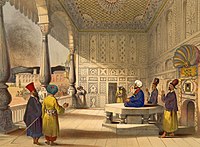افغان یهودان יהודי אפגניסטן | |
|---|---|
 Jewish cemetery in the city of Herat, 2009 | |
| Total population | |
| 10,300 | |
| Regions with significant populations | |
| Israel | 10,000 |
| United States | 200 families |
| United Kingdom | 100 |
| Afghanistan | 0[1] |
| Languages | |
| Hebrew, Dari Persian, Tajik Persian, and Pashto | |
| Religion | |
| Judaism | |
| Related ethnic groups | |
| Persian Jews and Bukharian Jews | |
| Part of a series on |
| Jews and Judaism |
|---|
| Part of a series of articles on |
| Religion in Afghanistan |
|---|
 |
| Majority |
| Sunni Islam |
| Minority |
| Historic/Extinct |
| Controversy |
| History of Afghanistan |
|---|
 |
| Timeline |
The history of the Jews in Afghanistan goes back at least 2,500 years. Ancient Iranian tradition suggests that Jews settled in Balkh, a Zoroastrian and Buddhist stronghold at the time. The Kingdom of Judah collapsed in 587 BCE leading to this migration.[2] In more recent times, the community has been reduced to complete extinction.[3][4] At the time of the large-scale 2021 Taliban offensive, only two Jews were still residing in the country: Zablon Simintov and his distant cousin Tova Moradi. When the Islamic Emirate of Afghanistan was re-established by the Taliban in August 2021, both Simintov and Moradi made aliyah on 7 September 2021 and 29 October 2021, respectively, leaving Afghanistan completely empty of Jews. Today, the overwhelming majority of the Afghan Jewish community resides in Israel, with a small group of a few hundred living in the United States and the United Kingdom.
In Afghanistan, the Jews had formed a community of leather and karakul merchants, landowners, and moneylenders.[citation needed] Jewish families mostly lived in the cities of Herat and Kabul, while their patriarchs traveled back and forth on trading trips across Afghanistan; they carved their prayers in Hebrew and Aramaic on mountain rocks as they moved between the routes of the Silk Road.[2]
- ^ "Woman now thought to be Afghanistan's last Jew flees country". independent. 29 October 2021. Retrieved 2021-11-12.
- ^ a b "Balkh". www.jewishvirtuallibrary.org. Retrieved 2018-11-12.
- ^ Aharon, Sara Y. (2011). From Kabul to Queens : the Jews of Afghanistan and their move to the United States. American Sephardi Federation. ISBN 9780692010709. OCLC 760003208.
- ^ Cite error: The named reference
Arbabzadah-2017was invoked but never defined (see the help page).